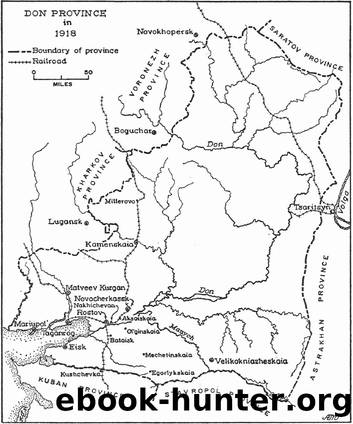Red Advance, White Defeat by Peter Kenez

Author:Peter Kenez [Kenez, Peter]
Language: eng
Format: epub
Tags: History, Russia & the Former Soviet Union, Military, Wars & Conflicts (Other), Modern, 20th Century
ISBN: 9781955835176
Google: YMc8EAAAQBAJ
Publisher: New Acdemia+ORM
Published: 2008-07-01T16:08:05+00:00
ODESSA
In the first months of 1919 the Volunteer Army became involved in a complex series of events which took place in Odessa. By studying this involvementâthe White generalsâ relations with French interventionists and local politiciansâwe may gain additional insights into the Whitesâ conception of the Civil War.
Odessa, one of the largest cities in the Ukraine, was not a typical Ukrainian city. Only 17 percent of its population was Ukrainian; 36 percent were Jewish, 39 percent were Russian, and there were small minorities of Greeks, Armenians, and Poles.2 Ukrainian nationalism had only a limited appeal here, and the nationalists regarded the town as an alien entity. Odessa was established only in the late eighteenth century, but it grew quickly and by the time of the Revolution it was not only one of the largest ports of the country, with almost a million inhabitants, but also a center of industry with a sizable working class.
In the beginning of December 1918, the Austrians and Germans withdrew from Odessa and it seemed the pattern of events would be similar here to developments in Kiev.3 The authority of Mustafin, the Hetmanite governor, disintegrated as the foreigners departed.4 Skoropadskii named General Biskupskii commander of the small and demoralized Ukrainian forces, and he hoped to save the city from Petliura by enlisting the aid of the organization of Russian officers. The Volunteer Army center, which had been operating under the command of Admiral Neniukov in semi-clandestine circumstances, had only 1500 men.5 As in Kiev, the Russians had to make the unpalatable choice between fighting for Skoropadskii, whom they disliked, or coming under the occupation of Petliura, whom they hated. They chose to fight.
Politicians of various persuasions, from radical socialists to monarchists, tried to fill the power vacuum. The situation became further complicated when most of the delegates to the ill-fated Jassy conference came to Odessa. This conference had been organized to unify the White camp and to coordinate the actions of the anti-Bolshevik movement with the plans of the Allies. The delegates moved to Odessa because they wanted to be on hand when the intervention actually began. The two representatives of the Volunteer Army, V. V. Shulgin and A. N. Grishin-Almazov, soon found themselves deeply involved in the local situation. The energetic Shulgin took charge. He persuaded Admiral Neniukov to hand over command to the 32-year-old General Grishin-Almazov. The change in command made little difference: the Russian forces were obviously not strong enough to stop the nationalists, and Denikin was not in a position to give assistance. The Petliurists entered the city on December 11, and the Russians were saved from complete defeat and humiliation only by the help of a remarkable French diplomat, Emile Henno.
Henno had been a low-ranking member of the French mission to the short-lived Ukrainian rada at the end of 1917 and later worked on the staff of the French Embassy at Jassy. The confused circumstances and the lack of clarity in French policy made it possible for a junior diplomat to take important initiatives.
Download
This site does not store any files on its server. We only index and link to content provided by other sites. Please contact the content providers to delete copyright contents if any and email us, we'll remove relevant links or contents immediately.
| Africa | Americas |
| Arctic & Antarctica | Asia |
| Australia & Oceania | Europe |
| Middle East | Russia |
| United States | World |
| Ancient Civilizations | Military |
| Historical Study & Educational Resources |
Red Famine: Stalin's War on Ukraine by Anne Applebaum(2928)
Midnight in Chernobyl by Adam Higginbotham(2541)
Chernobyl by Serhii Plokhy(2535)
Midnight in Chernobyl: The Untold Story of the World's Greatest Nuclear Disaster by Adam Higginbotham(2222)
The House of Government by Slezkine Yuri(2200)
Red Shambhala by Andrei Znamenski(2193)
The Gulag Archipelago (Vintage Classics) by Aleksandr Solzhenitsyn(2096)
Red Notice by Bill Browder(2070)
All the Kremlin's Men by Mikhail Zygar(2064)
From Cold War to Hot Peace by Michael McFaul(2029)
Putin's Labyrinth(2016)
From Russia with Lunch by David Smiedt(1971)
The Future Is History by Masha Gessen(1904)
A People's Tragedy by Orlando Figes(1864)
The Romanovs by Simon Sebag Montefiore(1820)
How to Tame a Fox (and Build a Dog): Visionary Scientists and a Siberian Tale of Jump-Started Evolution by Lee Alan Dugatkin & Lyudmila Trut(1769)
Putin's Labyrinth: Spies, Murder, and the Dark Heart of the New Russia(1745)
The Lost Spy by Andrew Meier(1745)
Art and Revolution by John Berger(1721)
